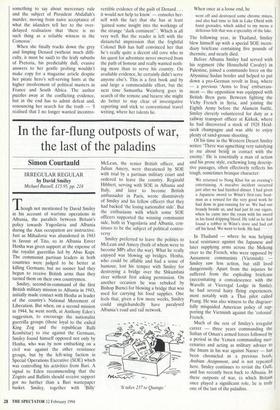In the far-flung outposts of war, the last of the
paladins
Simon Courtauld
IRREGULAR REGULAR by David Smiley Michael Russell, f15.95, pp. 218 Though not mentioned by David Smiley in his account of wartime operations in Albania, the parallels between Britain's policy towards Yugoslavia and Albania during the Axis occupation are instructive. Just as Mihailovic was abandoned in 1943 in favour of Tito, so in Albania Enver Hoxha was given support at the expense of the royalist guerrillas led by Abas Kupi. The communist partisan leaders in both countries were judged to be better at killing Germans; but no sooner had they begun to receive British arms than they turned them on their own countrymen.
Smiley, second-in-command of the first British military mission to Albania in 1943, initially made contact with Hoxha as leader of the country's National Movement of Liberation. But when, on a second mission in 1944, he went north, at Anthony Eden's suggestion, to encourage the nationalist guerrilla groups (those loyal to the exiled King Zog and the republican Balli Kombetar) to rise against the Germans, Smiley found himself opposed not only by Hoxha, who was by now embarking on a civil war against the other resistance groups, but by the left-wing faction in Special Operations Executive (SOE) which was controlling his activities from Bari. A signal to Eden recommending that the Zogists and Ballists should receive support got no further than a Bari wastepaper basket. Smiley, together with 'Billy' McLean, the senior British officer, and Julian Amery, were threatened by SOE with trial by a partisan military court and ordered to leave the country. Reginald Hibbert, serving with SOE in Albania and Italy, and later to become British ambassador in Paris, wrote dismissively of Smiley and his fellow officers that they had backed 'the losing nationalist side'. But the enthusiasm with which some SOE officers supported the winning communist side, both in Yugoslavia and Albania, con- tinues to be the subject of political contro- versy.
Smiley preferred to leave the politics to McLean and Amery (both of whom were to become MPs after the war). What he really enjoyed was blowing up bridges. Hoxha, who could be affable and had a sense of humour, lost his temper with Smiley for destroying a bridge over the Shkumbini river without first asking permission. On another occasion he was rebuked by Bishop Bumci for blowing a bridge that was used for carrying his food supplies. One feels that, given a few more weeks, Smiley could singlehandedly have paralysed Albania's road and rail network.
'It takes 237 to Quango.' When once at a loose end, he
went off and destroyed some chrome mines, and also had time to fish in Lake Ohrid with hand grenades, which added to my menu a delicious fish that was a' speciality of• the lake.
The following year, in Thailand, Smiley blew himself up with a special SOE incen- diary briefcase containing five pounds of thermite, and nearly died.
Before Albania Smiley had served with his regiment (the Household Cavalry) in Palestine, joined a commando force on the Abyssinia/ Sudan border and helped to put down a pro-German revolt in Iraq, where — a previous 'Arms to Iraq' embarrass- ment — the opposition was equipped with British Bren guns. Between fighting the Vichy French in Syria, and joining the Eighth Army before the Alamein battle, Smiley cleverly volunteered for duty as a railway transport officer at Kirkuk, where he had discovered a stock of 1928 Heid- sieck champagne and was able to enjoy plenty of sand-grouse shooting.
Of his time in the Western Desert Smiley writes: 'There was something very satisfying to me about being in contact with the enemy.' He is essentially a man of action and his prose style, eschewing long descrip- tive passages, often effectively reflects his tough, sometimes brusque character:
We returned to Nong Khai for an evening's entertaining. A macabre incident occurred just after we had finished dinner. I had given a Japanese sword to Winn's first-rate boat- man as a reward for the very good work he had done in gun-running for us. We had our brandy beside us, and had just lit our cigars, when he came into the room with his sword in his hand dripping blood. He told us he had found a robber in Winn's store and had cut off his head. We went to look. He had.
In Thailand — where he was helping local resistance against the Japanese and later supplying arms across the Mekong river to the French, who were opposed by Annamese communists (Vietminh) Smiley saw less action, but still lived dangerously. Apart from the injuries he suffered from the exploding briefcase (necessitating a convalescence with the Wavells at Viceregal Lodge in Simla), he had several hairy flying experiences, most notably with a Thai pilot called Prang. He was also witness to the disgrace- fully misguided American policy of sup- porting the Vietminh against the 'colonial' French.
Much of the rest of Smiley's irregular career — three years commanding the Sultan of Oman's armed forces followed by a period in the Yemen commanding mer- cenaries and acting as military adviser to the Imam in his war against Nasser — has been chronicled in a previous book, Arabian Assignment, and is not repeated here. Smiley continues to revisit the Gulf, and has recently been back to Albania. In these outposts of war, in which Britain once played a significant role, he is truly one of the last of the paladins.


















































 Previous page
Previous page